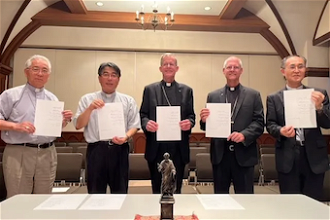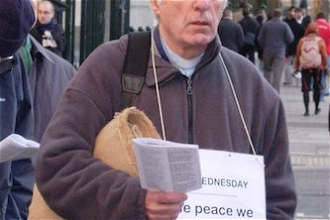Japanese priest speaks on dialogue between Shintoism and Christianity
Source: Fides
Japanese priest Fr Yuji Sugawara SJ, professor at the Pontifical Gregorian University, outlined the relationship between Shintoism and Christianity in Japan, in an interview with Agenzia Fides.
Fr Yuji said that Shintoism is the oldest traditional religion in Japan, begun by the pre-historic peoples living in central Asia, and has been left as it is today after a long co-existence shared with Buddhism. In Shintoism, there are no doctrines or explicit ethical norms. It is based on an animist vision, the Kami, spiritual essences or gods that are manifested through nature. The worship of ancestors and the Emperor (until the modern reform), who was considered to have divine origin, are also at the center of this religion.
Today, he said, Shintoism continues to play a key role in Japanese culture, however those who practice it are dwindling in number and there is a development of something called sincretism, a "homemade" blend with Christianity. Many Japanese, although they may not accept Baptism, seem interested in its teachings and consider themselves Christian. This offers the Church a fertile ground in dialoguing with Shintoism and in general, with religions and the modern culture.
Fr Yuji Sugawara told Fides: " In Japan today being a Shintoist is above all a cultural inheritance. As there is no 'shintoist baptism,' it is impossible to tell how many people are still really practicing. For the same reason, the Japanese do not feel truly identified with their traditional religion and show a profound interest for Christianity. Many request marriage in the Church." With this in mind, the dialogue between the two religions is something more that simply confronting a series of subjects, and it is rooted in the concrete life experiences.
"Dialogue is more of a peaceful and friendly encounter. Above all, it is a spiritual encounter, in the sense of the will to pray, in respecting differences. In a secularized nation like Japan, the people today no longer pray. Thus, prayer takes on a great significance, above all for a traditional religion like Shintoism, where prayer is more important than ethics. There is also an apostolic activity that is sustained by the mutual collaboration on charitable themes and aid. Lastly, there is an abundance of well-prepared studies available on the two religions. Although, I think the truest encounter happens in the day-to-day, with simple co-existence. In the end, Christians continue to be a minority and their very presence in society is an important factor in bearing witness. We can think, for example, in the innovation for Japanese women, with the message of freedom. However, the influences have often been stifled by the hostilities of the political power, especially by the shogun."
In the 1800s, as well, Shintoism suffered a great interference by the State. In order to encourage the country's modernization, more and more importance was given to the worship of the Emperor. Fr Sugawara said, " from 1600, the shogun regime had place the Emperor in a corner. In 1800, with the end of the old regime, Emperor Meyi needed to legitimize his new position of leadership. Shintoism offered a mythology that already had the characteristic of the view of the Emperor as a divine figure. The consequence of this policy was the Japanese's sense of invincibility, until their defeat in World War II. The Kamikaze pilots themselves, lead to suicide, were victims of this religion of the state."
Today, Japan is a democratic nation with typically Western lifestyles. The challenge, therefore, for both Shintoism and Christianity, is to collaborate in the common good and awaken people to the questions about the meaning of their own lives. "This is why the Church is fully committed to the missionary field, with the active presence of many religious orders," Fr Sugawara concluded.





















